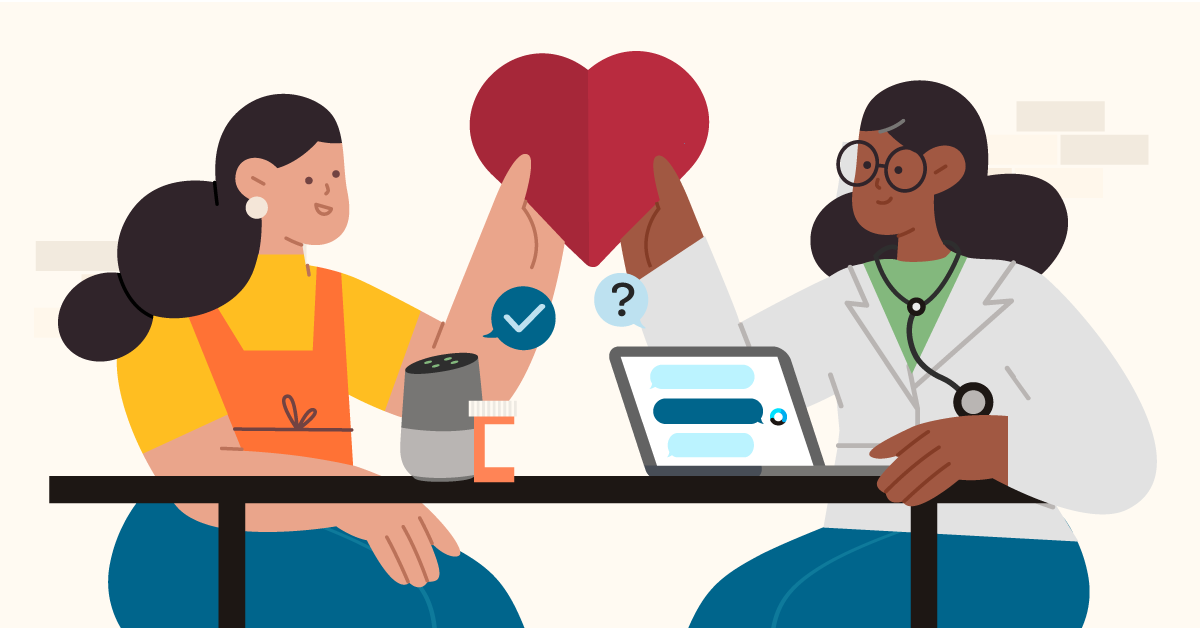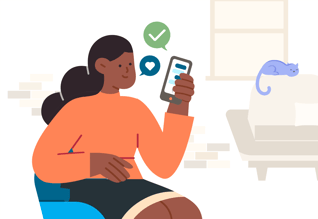
Automation with Empathy™ - Personalized Healthcare at Scale
Empathy (n). - the ability to understand and share the feelings of others
Empathy in Healthcare 
Healthcare providers are walking a tightrope between objectivity and empathy. A standardized perspective is necessary when diagnosing disease and devising treatments, but providers also need to personalize their approaches and empathize with patients.
While sympathy and compassion are reactive responses, empathy is more complex, and subtler factors such as tone, body language, facial expression, and other non-verbal cues can influence it.
"In clinical settings, this trait encompasses much more than understanding a patient's medical history, symptoms, and treatment," (1) it requires healthcare providers to understand their patient's plight by standing in their shoes and responding accordingly. During seven years as a practicing physical therapist, I witnessed firsthand the power and importance of communicating empathy to patients.
“Patient care is more than just healing - it's building a connection that encompasses mind, body and soul." (2) -Cleveland Clinic
Patients value empathy and it plays a crucial role in the provider-patient relationship, fostering better communication, adherence, outcomes, and patient satisfaction. For example, researchers at Massachusetts General Hospital found that we can attribute 65% of patient satisfaction to physician empathy (3).
Capturing Empathy in Digital Healthcare
 The past year has highlighted the need for greater empathy in healthcare - and all aspects of our lives. It has also increased the demand for digital health tools. However, as the necessity for virtual and digital experiences grew due to the COVID-19 pandemic, people recognized the power and benefits of technology but also the potential to lose empathy in those experiences.
The past year has highlighted the need for greater empathy in healthcare - and all aspects of our lives. It has also increased the demand for digital health tools. However, as the necessity for virtual and digital experiences grew due to the COVID-19 pandemic, people recognized the power and benefits of technology but also the potential to lose empathy in those experiences.
Research on general online communication (video calls, email, and texting) shows the experience of empathy is compromised because non-verbal cues are harder to pick up on, which diminishes the listener's attention span (4).
With the explosion of telemedicine and other virtual experiences, research indicates that the expression of empathy is significantly reduced in these settings as well (3). Still, 81% of healthcare executives report that their organization is transforming digitally at an accelerated pace (5). As organizations now walk the line of automation and empathy, the clear solution is to deliver Automation with Empathy™... but how?
Automation with Empathy™
 At Orbita, our core belief is that digital experiences should provide convenience and ease without losing that empathetic touch that patients crave and need.
At Orbita, our core belief is that digital experiences should provide convenience and ease without losing that empathetic touch that patients crave and need.
With our platform as the foundation, Orbita delivers self-service solutions that empower users to receive and access the information and resources they need, when they need them, and where they want to be reached.
Each solution has five core technical elements (modality, integration, conversational dialog, interaction models, and dashboards) to deliver intelligent conversational experiences (6). Along with these features, we provide virtual assistants that empathize with the end-user by listening, understanding, and adapting.
1. Listen
Above all, our virtual assistants are good listeners. We want to give all end-users an environment in which they feel empowered to use their voice. To accommodate the various ways in which patients and HCPs prefer to communicate, our virtual assistants are omnichannel and multimodal. The experience can be adapted to each device and channel to provide the most natural and intuitive encounter.
2. Understand
When responding to the user, it is important that the virtual assistant validates what the user has shared and never responds with language that is too technical, needlessly redundant, or unkind. The virtual assistant uses tone to demonstrate that it understands the context of the conversation. Picking up on subtler social cues such as frustration, sarcasm, or urgency enables the bot to respond accordingly. This means the experience may go beyond words and use images, icons, videos, and emojis to mirror some of those non-verbal cues that are often missing from digital experiences.
To further demonstrate understanding of the user's unique journey and situation, our virtual assistants are capable of anticipating future requests or needs, such as suggesting an appointment with a podiatrist when a patient says they have foot pain or connecting a patient with a live agent in the case of an emergency.
3. Adapt
Just as these solutions can adapt the experience based on the device or channel the user prefers, the virtual assistant's persona can be adjusted to better connect with certain users. These personas are pre-built and designed with specific patient populations, medical conditions, and organizational needs in mind to deliver personalized interactions.
As the strong foundation underpinning these specific solutions, our platform technology is continuously adapting and learning how users engage and behave with our bots and voice skills. Our ears are always open and constantly digesting new feedback and data to hear what the market wants and needs, such as our breakthrough innovation, the recently-launched new Orbita Solution Center that transforms how leading healthcare organizations deploy voice and chatbot virtual assistants to close gaps in care (7).
Resources:
(1) The Importance of empathy in healthcare: advancing humanism, Jerry Stone, 2019 January 28. https://blog.medicalgps.com/the-importance-of-empathy-in-healthcare/
(2) Empathy: The Human Connection to Patient Care, Cleveland Clinic, 2013 February 28. Youtube Video Link
(3) Emotions, Technology and Behaviors, Sharon Y. Tettegah & Dorothy L. Espelage, 2016. https://www.sciencedirect.com/book/9780128018736/emotions-technology-and-behaviors
(4) The emerging Issue of Digital Empathy, Christopher Terry, PharmD & Jeff Cain, EdD, MS, Am J Pharm Educ, 2016 May 25. https://www.ncbi.nlm.nih.gov/pmc/articles/PMC4891856/
(5) Accenture Digital Health Technology Vision 2021, 2021 June 7, Research Report, Link
(6) Breaking Down Orbita's New Solution Center for Patient Acquisition and Retention, Bill Cava, 2021 August 12. Link
(7) Orbita Partners with Healthcare Organizations to Unveil the Future of Omnichannel Virtual Healthcare Assistants, Orbita Press Release, 2021 August 10. Link

